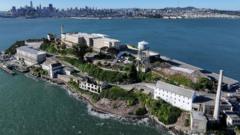US President Donald Trump has reaffirmed his intention to reopen and renovate Alcatraz, the historic island prison situated in San Francisco Bay, a site notorious for its past as a high-security federal penitentiary. Alcatraz, which closed its doors in 1963, has become a major tourist attraction, drawing millions annually. Trump believes the facility should once again serve as a secure location for dangerous offenders and a message of law enforcement strength. Nonetheless, experts argue that the prospect of reviving Alcatraz as a functioning prison is unrealistic.
Alcatraz was originally constructed as a naval fortress but underwent significant modifications to become a military and later a federal prison. During its operational years, the facility held some of America's most infamous criminals, such as Al Capone and George "Machine Gun" Kelly. With a reputation for being escape-proof due to the hazardous waters surrounding it, the prison has been immortalized in films and literature, including the classic movie "Escape from Alcatraz."
The closure in 1963 was largely due to the excessive operational costs, as maintaining Alcatraz was nearly three times more expensive than other federal institutions. The island is currently maintained as a museum under the management of the National Park Service, attracting over 1.4 million visitors each year. Christine Lehnertz, head of the Golden Gate National Parks Conservancy, has emphasized its historical significance as an educational opportunity.
Trump’s assertion to restart operations at Alcatraz is not without precedent; similar considerations had been put forth by past administrations, including the Reagan administration in the early 1980s, but those proposals were ultimately dismissed because of the site’s historical value and inadequate facilities.
In his remarks, Trump expressed that Alcatraz symbolizes a necessary commitment to law and order, asserting that he is giving the idea serious consideration. Despite Trump's enthusiasm, critics like former BOP director Hugh Hurwitz and historian Jolene Babyak contend that restoring Alcatraz into a viable prison involves unwieldy logistics and prohibitively high costs. Current conditions of the facilities, including structural deterioration and inadequate utilities, add to the skepticism regarding the plan's execution.
With modern federal prisons costing significantly more to operate than in the past, estimates suggest that housing inmates in Alcatraz could escalate expenses drastically, alleviating doubts among experts about the practicality of Trump's vision.
Critics underline that the idea, while intriguing, reflects an overly romanticized view of Alcatraz's historical narratives rather than a realistic approach to contemporary correctional challenges. John Martini, a historian familiar with Alcatraz's history, warns that the facility could not support current prison operations without substantial investment in infrastructure improvements.
In the wake of Trump's announcement, discussions are intensifying around the potential implications and challenges involved in reviving Alcatraz, further adding complexity to America's ongoing debates about criminal justice and prison reform.





















